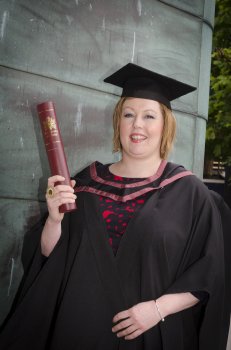
As an occupational therapist Catherine Cullen is dedicated to working with children and young people with autism spectrum disorders.
And it was this dedication which inspired the 33-year-old from outside Coalisland, Co Tyrone, to widen her career options and study for a law degree.
Today, she graduates with first class honours and is grateful that the University of Ulster was able to offer part-time education.
“My interest in law initially developed when I was studying occupational therapy (OT) at the University of Ulster and completed a module on ‘Exploring Legal Aspects of OT’,” explained Catherine.
“I chose to study for a LLB Hons degree at the University’s School of Law as it accommodated part-time learning. This suited me perfectly as I work as an occupational therapist at the Middletown Centre for Autism in Co Armagh.”
Catherine’s in-depth dissertation entitled ‘Asperger’s Syndrome (AS) and Murder: Considerations of Culpability, Insanity and Diminished Responsibility’ was inspired by her interest in the condition.
“My interest in Asperger’s Syndrome has developed as Iwork with children and young people with autism spectrum disorders,” she said.
“As I read more and more about the core features of the condition I began to wonder how these individuals were managed within the criminal justice system. That’s how my research started.
“This led to me discovering that there are a lack of statistics indicating how many of these individuals come into contact with the criminal process in Northern Ireland and throughout the rest of the UK.
“While there is an emerging interest into how people with AS are managed generally, there does not appear to be any specific legal research which looks at the issues I explored in my dissertation.
“Through reading international AS scholarly literature, I became increasingly aware that many researchers are recommending insanity as a defence for murder.
“My research outlines that in the UK diminished responsibility should be argued instead and demonstrates how this defence is more adept to accommodating the concerns the AS literature raises, regarding culpability issues with AS offenders.
“The aim of my dissertation was to make recommendations to inform this debate from a legal perspective.
“I feel that this topic is just a drop in the ocean and that there are many other aspects of crime and Asperger’s Syndrome that need to be explored. This is something I would be interested in pursuing in the future.”
Catherine thoroughly enjoyed studying at the University of Ulster and said she found her course very relevant to her daily life and work. “There are many sacrifices which studying part-time requires in terms of both time and money, but this actually made me more determined to succeed,” she added.
“It was often challenging to retain a work/personal and life/study balance, but this enabled me to further develop other transferable skills.”
While Catherine is taking a year off from studying, she plans to return to the University of Ulster and study for a LLM in Clinical Legal Education.

















